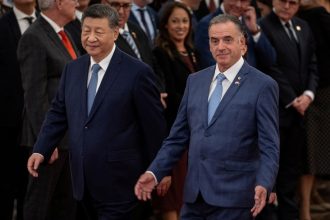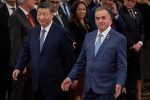SINGAPORE — Pharmaceutical companies in Singapore are currently navigating a wave of uncertainty following the United States’ announcement of steep new tariffs on imported branded drugs. These tariffs — pegged at a staggering 100% — could impact nearly S$4 billion (RM13 billion) worth of Singapore’s pharmaceutical exports, putting jobs, innovation, and global supply chains at stake.
Singapore’s Deputy Prime Minister and Trade Minister, Gan Kim Yong, addressed the situation today, affirming that the government is actively seeking clarity on whether Singapore-based firms might qualify for exemptions under these new trade rules.
The core of the issue lies in a bold move by US President Donald Trump, who declared that these 100% tariffs will apply to all imported branded drugs — unless companies establish manufacturing operations within the United States. This approach aims to push pharmaceutical giants to build domestic infrastructure, but it also threatens long-standing global trade partnerships.
Pharmaceutical products make up approximately 13% of Singapore’s total exports to the US, with a majority being high-value branded medicines. “This is a real concern,” said DPM Gan. However, he noted that many pharmaceutical firms operating in Singapore are already planning or expanding their presence in the US, which could help them qualify for a tariff exemption.
DPM Gan shared that he met with US Commerce Secretary Howard Lutnick in August, and emphasized that ongoing trade discussions are being held between both nations — particularly focused on pharmaceuticals and semiconductors.
“Ultimately, we hope to secure an arrangement with the US that will allow our pharmaceutical companies to remain competitive in the US market,” said Gan.
“Whether the final tariff rate is 15 per cent or another figure, it’s subject to negotiation. But we’re hopeful for some preferential treatment, especially compared to the top-line rate currently proposed.”
Despite a Free Trade Agreement between Singapore and the US that’s been in place since 2004, Singaporean exports currently face a 10% baseline tariff. The effective US tariff rate on Singapore’s exports rose to 7.8% in July, up from 6.8% in April — primarily due to increased duties on steel and aluminium.
The ripple effects of such broad tariff hikes could extend beyond pharmaceuticals, affecting other key sectors such as semiconductors and consumer electronics, which together with pharmaceuticals make up roughly 40% of Singapore’s total exports to the US, according to the Monetary Authority of Singapore in a July statement.








